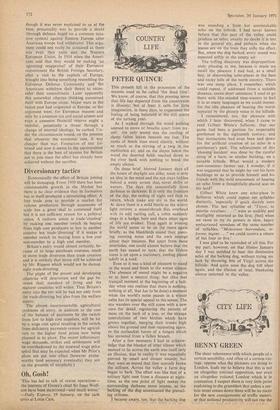PETER QUINCE
This present lull in the procession of the seasons used to be called 'the dead time'. We know, of course, that this pressing sense that life has departed from the countryside is illusory; but at least it calls for little imagination, in these days, to experience the feeling of being balanced at the still centre of the turning year.
As I walked through the wood nothing seemed to move or breathe apart from my- self: the only sound was the rustling of damp fallen leaves beneath my feet. The ranks of beech trees stood silently, without so much as the stirring of a twig in he motionless air, and on the slopes below the wood the deserted fields reached down to the river bank with nothing to break the empty silence.
On these brief, blurred January days all the hours of daylight are alike; noon is only an idea in the mind and the sun stays hidden behind a misty screen that, never shifts or wavers. The days slip uneventfully from darkness to darkness. It is only the frontiers of the day, the ending of night and then its return, which make any stir in the world. At dawn there is a mild bustle as the wintry light revives; a missel-thrush flies overhead with its odd rattling call, a robin suddenly sings in a hedge, here and there other signs of life are evident. Then again at evening the world seems to be on the move again briefly, as the blackbirds sound their pierc- ing roosting notes and the owls emerge about their business. But apart from these interludes, one could almost believe that the earth has ceased to turn, that the lifeless scene is set upon a stationary, cooling planet adrift in a void.
Even so it was a kind of pleasure to stand in the wood and listen to the winter silence. The absence of sound might be a negative or at least a neutral thing; but (like that tranquil moment at the beginning of a holi- day when one realises that there is nothing, nothing at all, that has to be done) a moment when the world's noise pauses in a winter calm has its special appeal to the senses. The eye wanders over the still scene with a new care for detail, registering the pattern of moss on the bark of a tree, or the strange convolutions of two birches which have grown together, merging their trunks high above the ground and then separating again, or the outlandish forms of a fungus which has sprouted from a fallen branch.
After a few moments I had to acknow- ledge that the blanket of utter silence which seemed to lie across the earth was itself only an illusion, that in reality it was repeatedly pierced by small and distant sounds; but they were so muted that they scarcely broke the stillness. Across the valley a farm dog began to bark. The effect was like that of a solitary light seen from a distance at night- time; as the one point of light makes the surrounding darkness more intense, so the barking of the dog accentuated the prevail- ing stillness.
I became aware, too, that the barking dog
was sounding a faint but unmistakable echo on the hillside. I had never known before that this part of the valley could produce an echo; usually no doubt it is lost in the general stir, and perhaps when the leaves are on the trees they stifle the effect. But, when the dog barked, every sound was repeated softly in the empty air.
The trifling discovery was disproportion- ately pleasing to me, because it made me recall the pleasure I had had, as a small boy, in discovering echo-places in the bare and rocky hills of the north country. There was one steep place, I remember, which could repeat, if addressed from a suitable distance, entire short sentences; I used to go there with like-minded time-wasters to hail it in as many languages as we could muster, for the idle pleasure of hearing the words repeated by the ghostly voice in the hillside.
I remembered, too, the pleasure with which I later discovered, when I came to read Gilbert White's Selborne, that our game had been a pastime for respectable gentlemen in the eighteenth century, and that instructions had even been laid down for the artificial creation of an echo in a gentleman's park. The achievement of this 'pleasing incident' was done by the careful siting of a barn, or similar building, on a suitable hillside. What would a modern cost-conscious farmer say, I wonder, if it was suggested that he might lay out his farm buildings so as to provide himself and his friends with the mild amusement of hearing an echo from a thoughtfully-placed seat on his land?
Gilbert White knew one echo-place in Selborne which could repeat ten syllables distinctly, 'especially if quick dactyls were chosen. The last syllables of "Tityre, tu patulae recubans . . ." were as audibly and intelligibly returned as the first; [but] when we came to try its powers in slow, heavy embarrassed spondees of the same number of syllables, "Monstrum horrendum, in- forme, ingens . ." we could receive a return of but four or five.'
I was glad to be reminded of all this. For my part, however, on that lifeless January day I was satisfied to hear .the diminutive echo of the barking dog, without trying my luck by throwing bits of Virgil across the hillside. And quite soon the dog fell silent again, and the illusion of total, blanketing silence returned to the valley.

































 Previous page
Previous page